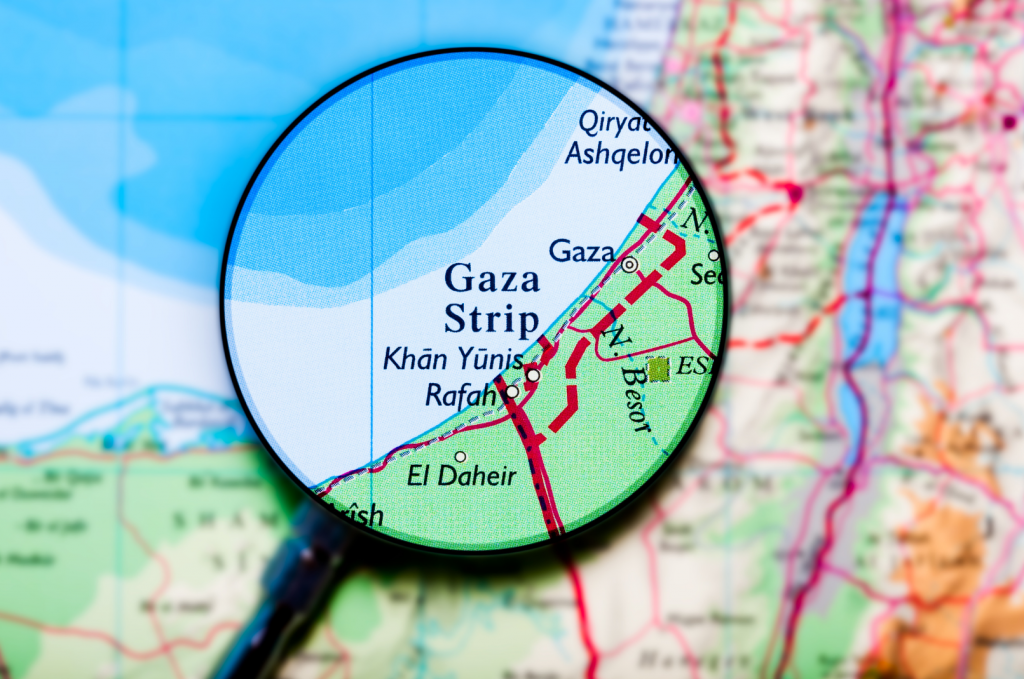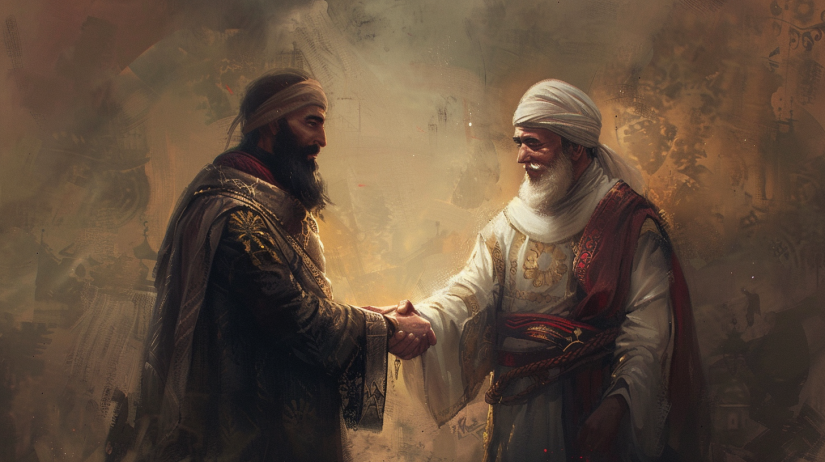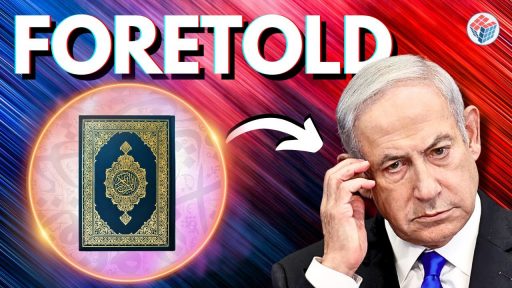Introduction
Sibling rivalry is everywhere. It dominates the cultures of many traditions. But perhaps none is as famous or as old as the rivalry between Cain and Abel, the two sons of Adam. The story finds its mention in the scriptures of the three Abrahamic religions. And for centuries, it has been a source of inspiration for many works of art – from Shakespeare’s Hamlet to modern fiction.
But unfortunately, despite the widespread prevalence of the narrative, people fail to appreciate its deeper meaning and its implications. While it may appear to be a historical ancient tale, devoid of any contemporary relevance, in reality its significance echoes throughout generations – even reaching the modern world.
Today, all eyes are set on the Middle East, as Israel leads – yet again – another bombing campaign across dense population centres in Gaza. This has led to around twenty thousand dead civilians – almost half of them children. On the world stage, Israel and the collective West justifies these actions as a response to Hamas’ attack on Israel proper. Furthermore, the discourse fails to acknowledge this episode as a snapshot of a century-old conflict, resulting from a settler-colonial project, slowly, but surely, perpetuating and broadening its occupation.
In this article we show how the latest war on Gaza is but one glimpse of a major prophecy unfolding right before our eyes. We examine the significance of the story in relation to the current conflict, and its future implications. This is the story of Cain and Abel in the 21st century. But this is a story as old as Abraham, the forefather of both Jews and Arabs.
For several months the eyes of the world have been on the horrific suffering in Gaza
The story of Cain and Abel is mentioned in the Quran, and the Hebrew Bible. The Biblical account is longer, while the Quranic narration is concise yet detailed. We shall ground our work in the Quranic version but will also refer to the Biblical narrative where relevant.
The Story of Cain and Abel
The Quran claims to be the final law sent to all mankind, while testifying the truth of previous scriptures at the point of their origin. In fact, the Quran is the only scripture that teaches that there is no nation on earth to which a warner has not been sent. The central mechanism by which it warns a nation is by setting precedents from history:
“And We sent down to you manifest Signs, and the example of those who have passed away before you, and an exhortation to the God-fearing.” (24:35)
Quranic narratives aren’t simply stories to be recited or enjoyed. Rather, many of them also act as prophecies, and thus offer an important lesson for future generations.
The Story of Cain and Abel is but one of those prophecies. In the Qur’an it finds its mention in the fifth chapter – named Surah Al-Maidah. We shall delve deeper into the narrative, examining its significance, in light of the Israeli-Palestinian conflict.
It begins as follows:
“And relate to them truly the story of the two sons of Adam, when they each offered an offering, and it was accepted from one of them and was not accepted from the other. The latter said, ‘I will surely kill thee.’ The former replied, ‘Allah accepts only from the righteous.” (5:28)
The story is very simple and easy to comprehend. Both sons of Adam, Cain, and Abel, offered sacrifices to God. But it was accepted only from the latter. Out of envy, Cain resolved to kill his brother, and cried “I will surely kill thee!” But the reply that Abel gives is worth pondering over: “Allah accepts only from the righteous.”
Cain had already understood that his sacrifice had not been accepted – which is why he had resolved to kill his brother. But how did Cain come to know of this? In other verses, the Qur’an declares that true sacrifice eventually bears fruit.[1]
In principle this need not be material benefits. However, over time, it becomes increasingly self-evident that those whose sacrifices are accepted bear fruit. It is then that the enemies of God seek to achieve through coercion what they could not through legitimate means.
This is where Abel’s reply is fitting. It is not an act of righteousness to kill one’s brother. And since God only accepts from the righteous, this act will never be accepted of God. It can only mean a greater separation from Him. And in the end, it will achieve nothing.
Abel continues:
‘” If thou stretch out thy hand against me to kill me, I am not going to stretch out my hand against thee to kill thee. I do fear Allah, the Lord of the Universe.” (5:29)
If Cain seeks to kill him, Abel will not react in the same manner, seeking to kill his brother. In other words, even in the face of threat to his life, Abel expresses his displeasure at the idea of killing his brother. He may seek to defend himself – but the very idea of seeking revenge displeases him. And he gives his justification: He fears the wrath of God.
Abel presses on:
“‘I wish that thou shouldst bear my sin as well as thy sin, and thus be among the inmates of the Fire, and that is the reward of those who do wrong.’” (5:30)
This time Abel warns his brother: Were he to carry out his act, he would certainly be punished by God. Not only would this not absolve him of his sins, he would incur further punishment for the act of killing his brother. The story ends with the following two verses:
“But his mind induced him to kill his brother, so he killed him and became one of the losers.
Then Allah sent a raven which scratched in the ground, that He might show him how to hide the corpse of his brother. He said, ‘Woe is me! Am I not able to be even like this raven so that I may hide the corpse of my brother?’ And then he became regretful.” (5:31-32)
In the end, Cain murders his brother. The last verse depicts a remorseful Cain – having realised the folly of his actions. The Quran does not condemn Cain unconditionally but leaves an opportunity for him to turn to repentance.
Islam and Judaism – Fulfilment of Prophecy
Jews and Arabs as Brothers
In the allegory of Cain and Abel, the Jews and Arabs are brothers. As the progeny of Isaac and Jacob, Jews are the cousins of Arabs who trace their lineage to Isaac’s elder brother, Ishmael.
The connection, nevertheless, carries a religious fervour more so than a genealogical one, as Judaism and Islam represent the two great monotheistic religions of the world, descended from the two sons of Abraham.
History as the Arbiter of Righteousness
Both Jews and Muslims consider Jerusalem to be a holy city, and the surrounding Land of Israel to be of significant religious relevance. For Jews, Jerusalem is the site of their bygone temples, and for Muslims the site of Prophet Muhammad’s spiritual night journey.
The Jewish people have not been able to exercise authority over the Land of Israel for well over 2,000 years. In contrast, the territory had been under the dominion of Muslim Arab rulers for the vast majority of their history. This is an important point that deserves reflection.
The Book of Psalms explicitly states that only the righteous shall inherit the land:
“But the meek will inherit the land
and enjoy peace and prosperity…
those the Lord blesses will inherit the land,
but those he curses will be destroyed.” (Psalms 37)
This is a prophecy, which also finds mention in the Qur’an:
“And already have We written in the Book of David, after the exhortation, that My righteous servants shall inherit the land.” (21:106)
The term ‘land’ clearly refers to the Land of Israel, as David – to whom the Book of Psalms is attributed – was the sovereign over this territory. In fact, the period in which David and his son, Solomon, lived was a high time in Jewish history – for this was a period when the First Temple was built, and Jewish culture truly flourished.
A woman sitting peacefully amidst the grass of Palestinian land
In matters of religious disputes, one can always argue one way or the other. But there is no greater arbiter of truth than history. If the Jewish nation had been righteous, it needs to self-reflect and ask itself why was it deprived of sovereignty over the land for thousands of years?
King David lived around 1000 BCE. The conquest of the Northern Kingdom of Israel by the Assyrians in 733 BCE culminated with the complete destruction of Jerusalem by the Babylonians in 587 BCE. Many tribes had been exiled. A portion of the tribes returned, and by 516 BCE the Second Temple had been rebuilt. Once again, they flourished – though in a limited fashion. The subsequent catastrophe arrived during Roman rule and took its fiercest turn during the Jewish-Roman wars (66 CE to 135 CE) that saw the destruction of Jerusalem and the burning of the Second Temple in 70 CE.
Since then, no Jewish temple has been built, and no Jewish sovereignty over the Holy Land has transpired – until of course, the establishment of the State of Israel, which we shall discuss later.
Nevertheless, history has made its final verdict. By virtue of scriptural prophecies, they have fallen from the threshold of God’s beloved people.
Righteousness as Honouring the Covenant
The story of Cain and Abel further tells us that only the sacrifices of the righteous are accepted. If we accept history’s verdict, then a question arises what exactly are those sacrifices? The biblical account leaves no doubt:
“Then the Lord said to Cain, “Why are you angry? Why is your face downcast? If you do what is right, will you not be accepted? But if you do not do what is right, sin is crouching at your door; it desires to have you, but you must rule over it.” (Genesis 4:6)
In other words, it is the doing of what is right, i.e., following the commandments as prescribed by God, which invariably leads one’s sacrifices to be accepted.
Similarly, in the Quranic narration, the term قربان (sacrifice) has been used – which is a noun derived from the verb قرب (to be near). This suggests that the deeds committed by the Jewish nation, instead of drawing them closer to God, were a means of turning them away from Him. In other words, they became distant from God – which in religious terminology is termed as becoming cursed of God.
Just as camels walk in a straight line, following their leader, religious believers are expected to demonstrate obedience to God and His Prophets
Being cursed of God is invariably linked with disobedience. Moses warned the Israelites that if they don’t abide by His commandments, they will become cursed:
“However, if you do not obey the Lord your God and do not carefully follow all his commands and decrees, I am giving you today, all these curses will come on you and overtake you”. (Deuteronomy 28:15)
In other words, righteousness demands one to honour their covenant with God. It is only then that one’s sacrifices will be accepted.
Rejection and Persecution of Prophets
We are left with the following question: Which commandments did the Israelites – and in their modern manifestation, the Jews – failed to abide by?
The destruction of the First Temple followed David, while the destruction of the Second Temple came after Jesus. This makes sense because we are told in the Quran that they were cursed by the tongue of David and, similarly, by the tongue of Jesus. The Bible alludes to the same. David’s heart-rending pleas in Psalms[2] and Jesus’ trials in the Gospels at the hands of the Pharisees are before us.
In other words, it was the rejection, followed by the persecution of the anointed ones, i.e., the elect of God that constituted disobedience to Him, and His commandments.
Nation whose Sacrifice was Accepted
The story of Cain and Abel is not simply symbolism for disobedience, however. It is also a symbolism for blessings bestowed upon the righteous. While Cain’s sacrifice was rejected, Abel’s sacrifice, on the other hand, was accepted. In the context under discussion, who exactly were the people whose sacrifices had been accepted?
We have already established that for much of history, following the destruction of the Second Temple, the Land of Israel came under the dominion of Muslim Arab rulers. It must therefore be the Muslims whose sacrifices had been accepted, given David’s prophecy. There is no other explanation.
Gift of Prophethood as Acceptance of Sacrifice
Nevertheless, the greatest blessing that any nation can receive is the gift of prophethood. Recited daily by the Muslims world over, the opening chapter of the Quran, Surah Al-Fatihah, is a fundamental prayer in Islam, by which Muslims beseech God to bestow blessings upon the Muslim Ummah. Chief among the blessings, as recounted in another chapter, are the blessings of prophethood.
Likewise, the Hebrew Bible emphasises that prophets, and those anointed by God are an immense blessing on the nations they come to serve. Moses brought the Israelites out of bondage, Cyrus enabled them to return to their homeland to build the Second Temple, and today Jews wait for the Messiah to bring them redemption.
The Hebrew Bible mentions numerous prophets, their miracles, and their prophecies, which concludes with the prophetic tradition of Malachi, over two thousand years ago. The Jewish nation needs to contemplate why they have been deprived of the blessings of prophethood for such a lengthy period, particularly, at the time of their greatest need.
The persecution of Jews all over Europe, which continued for a period well over a thousand years, culminated in the worst imaginable genocide against them in the form of the Holocaust.
Moses liberated Israelites from Pharoah’s bondage. But where is the modern Moses, given the unimaginable suffering in the 20th century? Theodor Herzl, an Austrian journalist, who is credited as the founder of Zionism, is often given this title. But he was an atheist – a disbeliever in God.
The Holocaust caused immense suffering for Jews and other groups
Israel and Palestine – Prophecy Continued
In the story of Cain and Abel, Cain recognises that his sacrifices failed to bear fruit – which is exactly why he seeks to kill Abel. In other words, enemies of God seek to achieve through force what they could not through appropriate channels.
How does this relate to the Israeli-Palestinian conflict?
Beliefs before Zionism
Jews eagerly await a messianic figure who would lead them to their redemption. Well before Zionism emerged as a powerful movement withing Judaism, by far the majority of the Rabbis viewed Jewish rule over the Holy Land prior to the coming of the Messiah as forbidden and a violation of the Torah. As recounted in the three traditional oaths, the Jews had been forbidden to ascend to the Land of Israel as a wall:
“Why are these three oaths needed? One, so that the Jews should not ascend to the Land of Israel as a wall, but little by little. And another one, that the Holy One, Blessed be He, adjured the Jews that they should not rebel against the rule of the nations of the world. And the last one is that the Holy One, Blessed be He, adjured the nations of the world that they should not subjugate the Jews excessively. “[3]
That is, if individual Jews wish to immigrate the Land of Israel, they were permitted to do so. But it was forbidden for them to leave their exile en masse and establish sovereignty over the Holy Land. The idea of actively seeking redemption, therefore, was seen as anathema. Redemption could only be a direct consequence of divine intervention.
Rise of Religious Zionism
While Jews had been persecuted all over Europe for hundreds of years, persecution against them deteriorated drastically in the 19th century – resulting in their mass migration out of the continent. Many of them had left for Palestine. And Palestinians, continuing with their age-old tradition, recognising them as their long-lost brothers, welcomed them in open arms.
As the First World War drew to a close, the British conquered Palestine from the Ottoman Empire, and established a mandate over the territory. Thirty years later, while the Jewish population was still a minority, a settler-colonial Jewish state was forced upon the native population. Facilitated by the United Nations, and propelled by the Zionist movement, and in a move deemed gravely unjust, the majority of historic Palestine was dispossessed of its indigenous populations. And in the months following, hundreds of towns and villages were destroyed or ethnically cleansed, with up to 700,000 Palestinians forcibly expelled from their homes.
The founding fathers of Zionism had either been irreligious or secular atheists. But once the ball started rolling, and secular Zionism came to have a strong footing in Jewish thought, many prominent Rabbis sought to justify their newfound zeal on the basis of religion.
A child protesting against injustice in Gaza
Key among them was Abraham Isaac Kook, one of the two Chief Rabbis of mandatory Palestine, and his son, Zvi Yehuda Kook. They understood secular Zionism as a means to a righteous end. Despite lacking a religious foundation, they saw the establishment of Israel as the principal component of Jewish redemption.
Drawing support from the Talmud[4] and Maimonides,[5] Rabbi Zvi Yehuda built on the works of his father and formulated three steps necessary for Jewish redemption. The first step was the compete Jewish sovereignty over the Land of Israel, followed by the destruction of the ‘Amalek’ – external forces challenging the legitimacy of Israel, before finally culminating in the construction of the Third Temple.[6]
Thus, on the back of secular Zionism emerged its religious counterpart which gained prominence in the 20th century.
Jewish Sovereignty over the Land of Israel
There’s a strong current within modern Jewish thought that refuses to acknowledge the legitimacy of Zionism. For many, Zionism as means of Jewish redemption is hard to swallow. So, how did this unholy alliance come to be?
In the Mishnah, a disagreement surfaces between two Rabbis concerning the role of repentance in ushering in the final redemption. While Eliezer ben Hyrcanus considers redemption as conditional upon repentance – a view that aligns with pre-Zionist thinking, his colleague, Joshua ben Hananiah, on the other hand, asserts that Jews will be redeemed at a fixed time in the future, independent of repentance.[7]
To anyone reading, it is clear that Eliezer is right. But Zvi Yehuda clings on to the latter.[8] He also draws support from Maimonides’ characterisation of the Messianic era.[9] Thus, by allowing repentance to be delayed, secular Zionism is able to serve as a vehicle for Jewish redemption.
The Destruction of the Amalek
When Benjamin Netanyahu declared the invasion of Gaza this year, he mentioned the Amalek. This was not accidental, or without purpose.
The Amalek have come to symbolise the greatest enemy of the Jews, driven by hatred of God and the Jewish way of life. In the Torah, while God initially took the responsibility of destroying the Amalekites,[10] Israelites were later commanded to do so themselves. This commandment required the Israelites to kill everyone including every woman, child, and livestock, sparing no one:[11]
“Remember what the Amalekites did to you along the way when you came out of Egypt… When the Lord your God gives you rest from all the enemies around you in the land he is giving you to possess as an inheritance, you shall blot out the name of Amalek from under heaven. Do not forget!” (Deuteronomy 25:17-19)
Traditional interpretation of this commandment has largely been limited to a symbolic one.[12] For Maimonides,[13] for instance, the commandment is fulfilled merely by the recitation of scripture, and cultivation of their hatred in one’s heart, for the Amalekites are no longer identifiable, and thus, had long ceased to exist.[14]
For Religious Zionists, however, the literal understanding of the commandment to destroy the Amalekites is an integral component of the redemptive process. As to their identification, Rabbi Zvi Yehuda discusses them sparingly and refrains from identifying them.[15] Similarly, no authoritative Rabbinic scholar is known to have issued a ruling decrying the Arabs or the Palestinians as the Amalekites. But, in practice, there’s a growing tendency in many Jewish circles to entertain this very idea.[16]
Rabbi Yisrael Hess, in his infamous 1980s article “Genocide: A commandment of the Torah” argued that the Palestinians are the descendants of the Amalekites, and thus should be destroyed under the biblical mandate. The Hebron Massacre of 1994, by one Baruch Goldstein, carried the same justification.[17]
But what exactly does the destruction of the Amalek serve? According to Zivi Yehuda, the Amalek are a means of purification of the Jewish nation – which fits well with the notion of Zionism’s secular origins. This process of fighting the Amalek must therefore continue.[18]
Thus, a genocidal notion is inverted, and given a spiritual meaning. Before the turn of the century, Rabbi Hess and Baruch Goldstein were considered to be at the fringes of Israeli society. But as the dispossession of indigenous land progresses, particularly in Jerusalem, and the surrounding regions, and as the Palestinians fight back, this dynamic serves as a positive feedback mechanism – which reinforces the ideological justification for the extermination of Palestinians as the Amalek of the modern age.
The Construction of the Third Temple
The final process of the redemptive process involves the building of the Third Temple. Traditionally, many Rabbis believed that the Third Temple would be built after the arrival of the Messiah, but this saw a major shift following the 1967 Arab Israeli War.
Among the student of Zvi Yehuda and his influential educational institute, Mercaz HaRav, was Yisrael Ariel who took part in the Israeli advance that led to the capture of East Jerusalem and the Temple Mount. Overcome with emotion and messianic fervour, Ariel wondered if Elijah and the Messiah had arrived:
“I thought to myself: The Messiah and the Prophet Elijah must have arrived. Who else would appear here during the battle for the Temple Mount after two thousand years? That was what seemed natural at the time…
Naturally, the two old men who should appear at this time are the Messiah and the Prophet Elijah. So, I went off to meet the Messiah and the Prophet Elijah. I asked myself where I would find them. Surely on the Temple Mount—they must have come to build the Temple…
I arrived at the Western Wall, and below me I saw two old men—none other than my two rabbis and teachers. We embraced and stood with tears running down our cheeks, in complete silence, sensing that Messiah was still on the way—it would just take another hour or two.”[19]
The Second Temple was built in less than a century after the destruction of the first. In contrast, it has been almost two thousand years since the destruction of the Second Temple. It is also over two thousand years since the Jewish dominance over the Temple Mount. Given the immense significance of the moment, Ariel, like many Religious Jews of his time, believed that the Messiah would come and initiate the process of constructing the Third Temple.
Many years went by but the Messiah failed to appear, to Ariel’s disappointment. In a poetic fashion, he expresses his disappointment giving a sense of longing and yearning for the arrival of the Messiah:
“I turn to the left; I turn to the right.
Where is our just Messiah?
Where is the messenger of the end of days . . .
Why is the sound of the news delayed?
And a heavenly voice reply: How can I come when the Temple is in ruins?
Hew the rock and build a house of glory!”[20]
In other words, Ariel, in a poetic style, claims that the coming of the Messiah is actually contingent upon the building of the Temple. With a sleight of hand, he sets the responsibility of constructing the Temple upon the Jewish nation to prepare for the arrival of the Messiah. This evidently means the destruction of the Al-Aqsa Mosque – considered by Muslims world over as one of the holiest sites in Islam.
Today, Ariel serves as the founder and the head of the Temple institute – the main force in Israel that aims to construct the Third Temple, and thus herald the coming of the Messiah.
Unrighteous Means to an End
In summary, the history of religious Zionism is a history of proactively adapting and shaping the course of events – as if to force the hand of God and accelerate the process of Jewish redemption.
This is Cain, personified in a nation.
The Religious Zionist Rabbis who justify the annexation of native land through murder, dispossession, and expulsion of Palestinians as the Amalek who oppose the divine plan are the Cain who killed his brother.
A child sitting amidst destruction in Gaza
But God accepts only from the righteous. No matter how the scriptures are twisted by such Rabbis in order to justify their actions, they will achieve nothing in the end: If they succeed in building the temple and driving out the Palestinian populations from the Land of Israel, there will be no Elijah that will descend, and no Messiah to look up to.
Just as Ariel stood crying on the Temple Mount with tears streaming down his cheeks and no sign of the Messiah, such will also be the case of the unfortunate ones on that day. But there will be one difference this time. They will have lost faith in Jewish redemption – having achieved all that they could muster.
True Redemption
Consequences of Rejecting Prophets
In the Biblical account of Cain and Abel, when Cain had killed his brother, God delivered his judgement:
“When you work the ground, it will no longer yield its crops for you. You will be a restless wanderer on the earth.” (Genesis 4:12)
That is, the Israelites will for ever live as a diaspora, moving aimlessly from one country to another, and never will they be able to succeed in building a nation of their own. Their work will bear no fruit.
Any effort to engineer a state in the Holy Land, or otherwise, by waging a war on the native populations will eventually collapse. Similarly, the State of Israel, as it exists in its current form, is a temporary phase akin to the Crusades that will soon cease to exist – that is, unless its inhabitants turn to God, and fulfil their covenant.
The Obligation of Accepting Prophets
The Quran states that God established a covenant from every people through their prophets making it obligatory upon them to believe in the prophets that come in the future:
“And remember the time when Allah took a covenant from the people through the Prophets, saying: ‘Whatever I give you of the Book and Wisdom and then there comes to you a Messenger, fulfilling what is with you, you shall believe in him and help him.’ And He said, ‘Do you agree, and do you accept the responsibility which I lay upon you in this matter?’ They said, ‘We agree;’ He said, ‘Then bear witness, and I am with you among the witnesses.’” (3:82)
Elsewhere, the Quran highlights that the covenant was taken from Israelites through Moses. In other words, the Israelites were obligated to accept each and every prophet that was sent for their reformation.
The Wailing Wall in Jerusalem, an important religious and historical site for Jewish people
In Jesus’ time, the Rabbis were known to be waiting for three prophesied figures – Elijah, Messiah, and the Prophet.[21] This is also corroborated in the Hebrew Bible, as prophesied by Malachi.[22] This means the Jews need to accept all three. The first two is a reference to John the Baptist, who carried the title of Elijah, and Jesus, son of Mary. But who exactly was the Prophet, who has been described as the “coming of the great and dreadful day of the Lord”?
Prophet Muhammad as the Prophet from Israelites’ Brethren
In the Torah we are told:
“The LORD thy God will raise up unto thee a Prophet from the midst of thee, of thy brethren, like unto me; unto him ye shall hearken”. (Deuteronomy 18:15)
The prophecy continues highlighting some of the distinguishing features of that prophet. He is no ordinary man, for he will resemble Moses, and just as Moses brought a new law, he too shall bring a new law. He will thus be unlike Elijah, or the Messiah. Moreover, he will be raised among the brethren of the Israelites, i.e., the Ishmaelites:
“And the LORD said unto me… I will raise them up a Prophet from among their brethren, like unto thee, and will put my words in his mouth; and he shall speak unto them all that I shall command him. And it shall come to pass, that whosoever will not hearken unto my words which he shall speak in my name, I will require it of him.” (Deuteronomy 18:18-19)
The similarities between Moses and Prophet Muhammad, the founder of Islam, are unparalleled. Just as Moses fled Egypt and dwelled in Midian for ten years before returning home to liberate the Israelites from Pharoah’s aggression, likewise Prophet Muhammad fled Mecca and dwelled in Medina for ten years before returning home to conquer the city from the Pharaohs of his age – the Quraish.
Majority of Israelites Accepted Islam
Contrary to popular opinion, Arabs are not a race. Historically, Arabs were a people from the Arabian Peninsula, descended from Abraham’s elder son, Ishmael. But today, an Arab is an individual who identifies with the Arabic language, and whose forefathers identified with Arab culture. In that context, no individual living today is a pure breed, descended from ancient Arabs. As Islam spread all over the Middle East and North Africa, people intermarried and eventually adopted the Arabic language.
Within that framework, Palestinians aren’t the descendants of foreign hordes from the Arabian Peninsula. They are mostly the descendants of ancient Hebrews who had converted – via Ebionite Judaism – to Islam in the 7th century.[23] Genetic studies also confirm this. In contrast, European Jewry – while having some genetic links to ancient Hebrews – are mostly the descendants of converts, from what is today Ukraine and Southern Russia.
The contrast between the Palestinians and Jews is worthy of note. Both have genetic links to ancient Israelites. And both are the children of Isaac. There is only one difference. One group – the majority – adopted Islam, and in the spiritual sense became the children of Ishmael, while the other – the remanent – rejected Islam.
The group that adopted Islam lived in the Land of Israel for thousands of years, while the other became a restless wanderer on the earth.
Why did Muslims lose the Holy Land?
In an earlier section we described the calamities that befell the Israelites. The calamities led to the expulsion of some of the Israelite tribes from the Land of Israel, and the destruction of Jerusalem. They can be divided into two periods, with each culminating with the destruction of the Temple, the centre of Jewish life. The 17th Chapter of the Quran highlights these particular junctures in the Israelite past, thus foretelling that the Muslims would also face similar catastrophes.
Indeed, the first catastrophe manifested after a similar timespan with the crusades, and the second commenced centuries later following the rise of western civilisation, and the establishment of the State of Israel.
In fact, just as the Second Temple was destroyed 40 years after the Jewish Messiah, Jesus, son of Mary, had left Palestine, so too the State of Israel was established after 40 years of the Muslim Messiah, Mirza Ghulam Ahmad.
Indeed, the establishment of the State of Israel serves as merely a sign among thousands of signs of the latter days. And once the Muslims accept their Messiah, non-Muslim occupation over Palestine will become a feature of a bygone era.
Conclusion
In the story of Cain and Abel, we find a regretful Cain. In Arabic the term نادم (one who is regretful) is derived from the verb ندم (to regret). Regret is the first stage towards توبة (repentance). It is a stage in which one recognises his sins and grieves for his actions but has, as of yet, not repented of them.
It is in this there is hope for the citizens of Israel.
Repentance requires one to give up his sins completely, to resolve to never repeat them, and to make necessary amends to one’s life. As Mirza Ghulam Ahmad, the founder of the Ahmadiyya movement, beautifully explains:
“Repentance refers to the state when man forsakes the ties that bind him to sin. When a person is indulged in a life of sin, he begins to dwell in this state and sin becomes his homeland, as it were. So, توبة (repentance) is to leave one’s homeland and رجوع (turning) means to purify oneself. It lies heavy on a person to leave their homeland and one is faced with thousands of difficulties in doing so. There are a myriad of problems that one is confronted with even when he leaves his home. But when it comes to migrating from one’s native land, an individual must sever ties with friends and loved ones, and bid farewell to everything, such as his hearth and home, his neighbours, the streets and alleys of his prior homeland, and its place of business. He is compelled to move to a new country and he never returns to his homeland. This is called repentance.”[24]
Should Jews wish to establish the Land of Israel as their homeland, first and foremost they need to depart the territory governed by their egos. They need to submit to the will of God and accept His chosen ones. If they repent and turn to God, He will return to them with His favours, as God promises in numerous places in the Hebrew Bible:
“Ever since the time of your ancestors you have turned away from my decrees and have not kept them. Return to me, and I will return to you.” (Malachi, 3:7)
Repentance, therefore, is a necessary condition without which a nation cannot be a recipient of God’s true blessings. In the dispute over the necessity of repentance, Zvi Yehuda pursues ambiguous verses over those that are clear, concise, and self-evident.[25] And, as the Qur’an tells us, none seeks ambiguity but those in whose hearts is perversity.[26] The entire dogma built by the Religious Zionists, therefore, reflects their spiritual state. They render repentance unnecessary and close the door to own redemption.
But alas, there is no other means but for the Jews in Israel, and indeed the world over, to fulfil their covenant with God and accept Prophet Muhammad as their spiritual guide.
And undoubtedly, there will come such a time when many will accept, like many of those in the past. And the rest, by divine action, will be driven from the Holy Land, like those before them, for David’s prophecy must continue to be fulfilled.
[1] The Holy Qur’an, 2:262
[2] Psalms 69
[3] Ketubot 111a.4
[4] Sanhedrin 20b.8
[5] The Laws of Kings and their Wars, Mishneh Torah, Maimonides, Chapters 11, 12
[6] Sovereignty, Sanctity, and Salvation: The Theology of Rabbi Tzvi Yehuda ha-Kohen Kook and the Actions of Gush Emunim, Richard L. Hoch, Page 92
[7] Babylonian Talmud, Sanhedrin Tractate, 97b – 98a
[8] Sovereignty, Sanctity, and Salvation: The Theology of Rabbi Tzvi Yehuda ha-Kohen Kook and the Actions of Gush Emunim, Richard L. Hoch, Page 110
[9] The Laws of Kings and their Wars, Mishneh Torah, Maimonides, 12:2
[10] Exodus 17:14
[11] Deuteronomy 25:17
[12] The Return of Amalek: The Politics of Apocalypse and Contemporary Orthodox Jewry, Martin Jaffee, Page 60
[13] The Laws of Kings and their Wars, Mishneh Torah, Maimonides, 5:4-5
[14] The Return of Amalek: The Politics of Apocalypse and Contemporary Orthodox Jewry, Martin Jaffee, Page 53
[15] Sovereignty, Sanctity, and Salvation: The Theology of Rabbi Tzvi Yehuda ha-Kohen Kook and the Actions of Gush Emunim, Richard L. Hoch, Page 103
[16] The Return of Amalek: The Politics of Apocalypse and Contemporary Orthodox Jewry, Martin Jaffee, Page 60
[17] The Return of Amalek: The Politics of Apocalypse and Contemporary Orthodox Jewry, Martin Jaffee, Page 61
[18] https://www.hartman.org.il/amalek/
[19] Jewish Fundamentalism and the Temple Mount, Page 34
[20] Jewish Fundamentalism and the Temple Mount, Page 37
[21] John 1:19-21
[22] Malachi 3-4.
[23] The Invention of the Jewish People, Shlomo Sand, Page 318
[24] Mafuzat, Volume I, Page 2
[25] Babylonian Talmud, Sanhedrin Tractate 97b.16
[26] The Holy Qur’an, 3:8



















4.5
5
Beautiful article and wonderfully researched. Jews call people Amalek but we don’t need to call them Cain, as history will deliver a clear verdict for all to see.